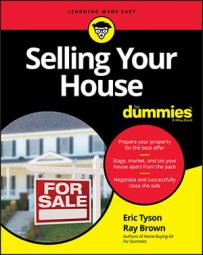The American Society of Home Inspectors (ASHI) is a professional association of independent property inspectors. ASHI membership doesn’t guarantee that the inspector is competent, but hiring a member of this organization increases the likelihood that you’ll be working with a qualified professional. You can’t buy your way into the ASHI by paying a fee. All ASHI-certified members must have performed at least 250 property inspections and must pass two written proficiency exams as a prerequisite of membership. ASHI members must also adhere to the ASHI standards of practice, continuing education requirements, and code of ethics. To find members in your area, call ASHI at (800) 743-ASHI (2744).
In the interest of full disclosure, allow prospective buyers to review your inspection report prior to making an offer if they want. However, encourage buyers to get their own inspections. Even the best inspector occasionally misses defects. If the buyers rely solely on your report and find repair problems after the sale is complete, you don’t want them claiming that you intentionally gave them a faulty inspection report to mislead them about your house’s condition.
Selecting the right property inspector
Choosing the right inspector when selling your house takes a little effort. Interview several property inspectors before hiring one. The following questions can help you select the best inspector:- Are you a full-time, professional property inspector? The only satisfactory answer is yes.
- How many houses do you personally inspect annually? Although the number of inspections varies from area to area, active inspectors usually average from 100 to 300 inspections per year. Be sure the inspector works primarily in the vicinity of your house and is familiar with local building regulations and codes as well as local problems (such as mud slides, earthquakes, floods, or tornadoes).
- Do you have any special certifications or licenses? Property inspectors generally have experience in some related field (such as construction, architecture, or engineering) or have worked as an electrician, plumber, or insurance-claim adjuster. This diversity brings extra depth to their inspections. Membership in the ASHI or other trade associations indicates at least a minimal knowledge of house-inspection procedures. Ask about the size of the inspector’s company and how long the company has been in business.
- What’s the scope of your premarketing inspection? Be certain that the inspection covers all of your house’s major structural and mechanical systems, inside and out, from foundation to roof. Anything less is unacceptable. Thoroughly inspecting a house or condominium of average size usually takes three to four hours.
You probably won’t be invited to join the buyers when their property inspector goes through your property. That’s why it’s critically important that you (and your agent, if possible) tag along when your inspector does the premarketing inspection. Reading the best report ever written is no substitute for seeing defects with your own eyes and hearing your inspector’s commentary on the significant findings.
Use this opportunity to question the inspector about a defect’s ramifications and explore corrective work alternatives. After completing the inspection, you understand why some defects cost megabucks to fix, and others are no big deal. Here are some questions to ask the inspector:- Will your report include a cost estimate for you to do necessary corrective work? Trick question. If the inspector says yes, don’t use the inspector. Good property inspectors only do inspections. They don’t do repair work themselves or generate referral fees for themselves by sending work to their pals. A good inspector can, however, help you determine repair costs by giving you a list of reputable contractors, roofers, electricians, plumbers, and other tradespeople who can give you corrective work quotes. Generally, more than one way is possible to fix a defect. You must decide the best way to deal with a problem after you consult the appropriate repair people.
- What type of report will I receive? Verbal reports and boilerplate, checklist reports are usually worthless. You need a written, narrative-type report that provides a detailed description of your house’s mechanical and structural condition and clearly explains the implications of the findings in plain English.
Get a sample report from each inspector you interview. The best way to find out if an inspector writes good reports is to read one and draw your own conclusion.
- Do you have errors-and-omissions (E & O) insurance? To err, unfortunately, is all too human. Even the best inspector misses a defect or two every now and then, which is why good property inspectors carry E & O insurance. If your inspector accidentally makes a mistake that costs you big bucks, E & O insurance can help ease your pain.
- May I call your recent customers for references? Good inspectors happily give you names and phone numbers for all of the satisfied customers you want. Bad inspectors, by definition, don’t have satisfied customers. Check at least three references per inspector. Ask references if, after the transaction was completed, major defects were discovered that the inspector missed. Also see if they’d hire the inspector again.
- How much will your inspection cost? A good inspection can cost anywhere from $350 to $800 depending on the property’s size, the inspection’s scope and degree of detail, and where the property is located — inspections cost least in the Midwest and South; they’re much more expensive in urban areas of New York and California. Beware of unrealistically low, “this week only” promotional fees offered by new inspectors just starting in the business. Don’t let inexperienced inspectors practice on you.
See whether the premarketing inspection includes an additional consultation at a later date to discuss the report’s findings with buyers who make an offer to purchase your house. Because time is money, the inspector probably adds an extra charge for this service. The fee is worth every penny, though, if the property inspector’s explanation helps you negotiate a lower corrective work credit.

